Past and present members of the Algonquin faculty submitted their fond memories of Dick Walsh and stories of his long legacy. Walsh, a former ARHS athletic director, teacher, coach and tireless community supporter, died at age 92 on September 14.
English teacher Sara Stein
Mr. Walsh would give me a hug every time I brought him my recyclable cans, which he would redeem. He would, in turn, donate the money to the school. Years ago, he would come to my room each week to collect them. More recently, I would bring them to him in the cafeteria or his car. He would pull the aluminum tabs off and donate them to a place that used the metal for prosthetics. Now, when I recycle my cans, I think of him, his kindness and generosity, and I admire how active he was in living his life through each of its stages.
Mr. Walsh had a true presence. When he couldn’t come to school anymore, the lunchroom became a different space for me. He was always ready with a smile and a hello. He encouraged me- “Keep those cans coming!” The cafe is now a bit more vacuous and impersonal to me, but I find myself on lunch duty eager to welcome students in. I think my instinct to do this came from seeing Mr. Walsh at work in the cafe.
When my son was little, he came to the summer baseball camps here at ARHS. Mr. Walsh was always here; he would tell the kids all kinds of stories about his experiences. When I’d pick him up, Mr. Walsh was always surrounded by boys, often laughing, but always listening. It was clear Mr. Walsh loved working with the young. He is a treasure.
Instructional Support teacher and ARHS alumna Alissa Luippold
Whether I was a student or staff member at the time, my brief conversations with Mr. Walsh always made my day… it wasn’t just how much I enjoyed seeing him and chatting with him, it was how much he truly loved every interaction we ever had too. I will always miss that, and him.
Fine & Performing Arts teacher Michelle Sheppard
Nine years ago, my Art I students returned from lunch upset that Mr. Walsh was no longer a presence in the cafeteria, and wanted to take action. I gave an impromptu lesson on street art and activism, and my students proposed we create a stencil of Mr. Walsh and spray paint them around the cafeteria (specifically on the trash cans). We compromised on layered paper posters inspired by [American artist] Shepard Fairey. When Mr. Walsh saw the posters hung in the hallway, he was so amused that he asked me to take a picture of him in front of them, so that he could share it with his children. His smile was unforgettable.
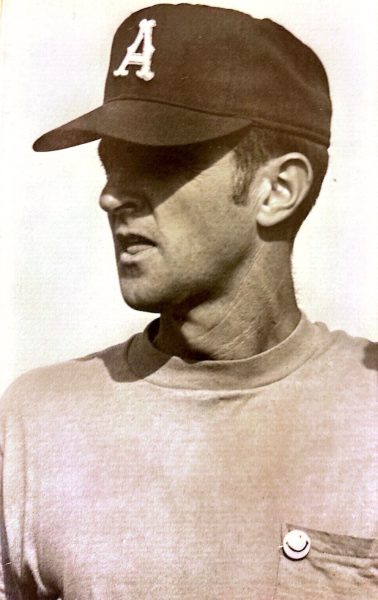
Social Studies teacher and ARHS alumna Amelia Braun
My first memories of Mr. Walsh were when I was a student here at Algonquin. He was a tremendous supporter of the gymnastics team, always making sure we had what we needed. This support continued when I became the head coach of the gymnastics team and eventually the MIAA gymnastics tournament director. He always had advice about my meets and tournaments to make sure they were the best they could be for the athletes. As a teacher, I would love to pass him in the hallway, playfully calling him “Trouble” because he was always making “Good Trouble”. He’d smirk and then give me all of the info. I’m going to miss that good trouble in our hallways.
Applied Arts teacher Christine Ferreira
When I started working here in the late 1990s, Dick came to Algonquin every day as he always has, but what I remember is that he brought his dogs with him to school. They were so cute and so well-behaved and often sought out those teachers and/or administrators who had dog bones in their desks. He was never without his furry best friends. They went with him everywhere.
English teacher Emily Philbin
Mr. Walsh was one of the first people I met here at ARHS, and in no time, I felt a strong bond with him. We both soon made sure to go out of our way to touch base each day, and I knew that even on the toughest days, he could bring a smile to my face and leave me laughing. Mr. Walsh was truly all heart, and he will always have a piece of mine.
Applied Arts teacher George Clark
In the mid-nineties and continuing on until the renovation project changed the layout of the school, Dick used to have a candy cart that he kept in a closet by the gym. At the end of the school day, he was a fixture in the hallway outside the gym, selling candy bars to students for fifty cents. He dealt in a lot of quarters. Frequently, he would perform sleight-of-hand tricks and make the quarters disappear, only to reappear in his hand as he “pulled them from the student’s ear.” He was pretty good at it! I can still picture his smile and the sparkle in his eyes as he winked at the student. Naturally, all of the money he raised went to the school.
Varsity Swim & Dive coach and retired teacher Jean Fedak
I first met Richard “Dick” J. Walsh in 1975, when I began to substitute teach at Algonquin Regional High School. The following year (76-77), as a 24-year-old, I was hired as a teacher and coach. Dick, (age 44 at that time,) was my first athletic director, entrusting me to coach both the girls’ JV and varsity volleyball teams at the same time and later that year, the girls’ JV basketball team. He was my mentor for all things athletic. Fair, tough and with high expectations, he built a phenomenal athletic program that quickly
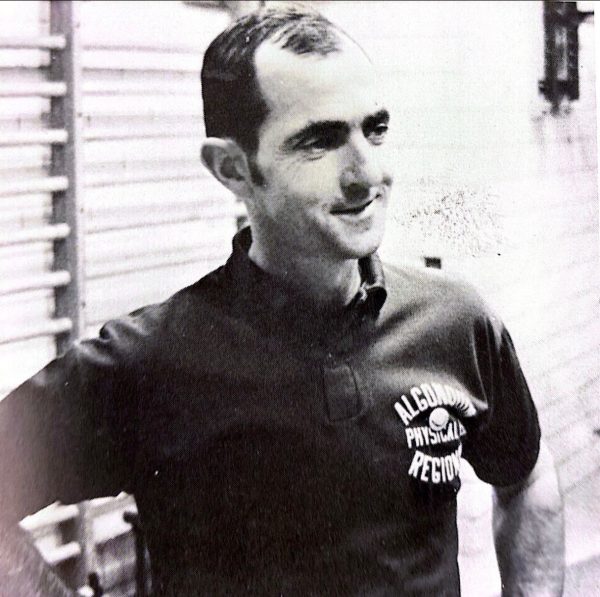
rose to be the envy of many throughout Central Massachusetts.
At the same time that he was the full-time athletic director, he was a full-time physical education teacher, the secretary of the state athletic directors and also coaching the varsity football team. Two of his football teams advanced to the state Super Bowl, with one of them emerging as Champion. He had a great sense of humor and a very competitive spirit, which served him well as a physical education teacher. Students saw him out running every day and, during the summers, he was often spotted riding his bicycle around Northborough. He walked the walk and talked the talk in terms of modeling fitness. He began teaching in Southborough elementary schools in 1954 and soon after became the head football coach at Algonquin when it opened. Around the 1970s, he was asked to join the high school staff so that the football coach could be in the building to help guide his athletes daily.
He is Mr. Algonquin. However, what most today do not know is how big his heart was and how deep his love for Algonquin was. To ensure that he had adequate funds to give the kids the things they needed that the budget did not cover, he sold candy bars from a cart in front of the gym every day after school
and he collected bottles and cans at lunchtime. He had a separate bank account for these funds. When the school wanted to build the first Snack Shack, he immediately went to that account and donated $5000. He often could be seen on the tractor mowing the fields in the summer. On the weekends, he opened the building at 5:30 in the morning, so teams could practice. These are only a few examples of how much he cared for Algonquin students, faculty, staff and the facilities. He did not believe one should do things for the accolades, but rather for the joy and love of the efforts and experiences. He was also a man of great faith. We had such fun working with Dick. We had the utmost respect for him. He will be missed.
English teacher Lindsay Coppens
I always enjoyed conversations with Mr. Walsh in the cafeteria, and I especially loved his stories about Algonquin’s past: when cows would roam the athletic fields and what it was like when Northborough and Southborough high schools came together. The Harbinger has lost one of our best sources of news tips. Often Mr. Walsh would find me and say with a twinkle in his eye, “You didn’t hear it from me, but your reporters might want to look into…”
Baseball coach and instructional aide Ken MacDonald
Coach Walsh is a big mentor in my life and consistently delivers a positive message. He did things for the right reasons and never wanted any credit. He was always available to listen and provide advice. Our mornings were spent before school with Mr. Walsh, Mr. Barry and Mr. McGowan catching up on sports
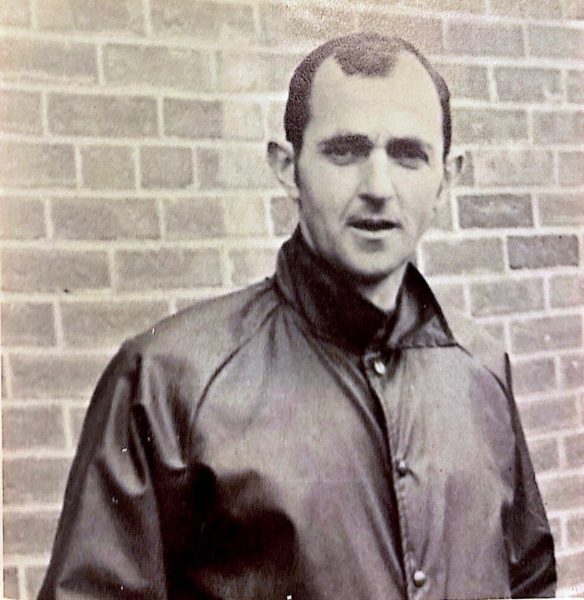
and other things. He consistently treated everyone in a welcoming way. For many athletic accomplishments, I will remember more how much he wanted everyone to feel included. He would notice a kid sitting by himself in the cafeteria and wonder what we could do to improve their experience to make more friends. When a student I tutored got injured playing football, he asked me every day how the student was doing and to continue to tell him he was and will always be part of Algonquin. He continued to ask how we could get this student to school and provided many ideas, which were successful in getting him to complete his education. He was a great mentor and left a positive impact on anyone who was fortunate enough to interact with him. He was also a big reason why I decided to coach baseball here; telling me I am already part of such a great school community and wanting me to coach the kids to success on and off the field. We can continue to honor him by spreading kindness and continuing to make Algonquin such a great welcoming school for everyone.
Retired Social Studies teacher Irwin Macklow
When I started working at Algonquin in 1963, Milford and Algonquin were in the same league and were often the top teams. Dick and I would often “go at it” about who would dominate in the next match-up. In the ‘60s, all forms, films and documents had to be delivered by hand, so as time went on I found myself being Dick’s messenger pigeon, carrying information between Algonquin and Milford.
Unlike Dick, who was a natural coach, I fell into it by necessity; the JV softball coach left at the last minute and they were desperate. I was comfortable “coaching” for the Citizen Bee [the Citizen Bee is
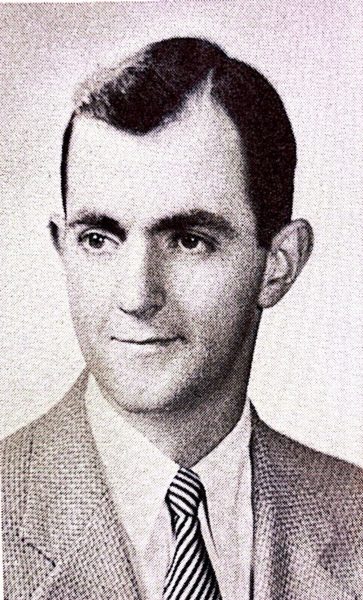
similar to a spelling bee and was sponsored by the Close Up Foundation. In 1988, Mr. Macklow had a student win the national competition and was awarded a trip to Brussels], but coaching an athletic team at Algonquin would be a different experience- there were “expectations”. When I expressed my concern to the athletic director he said, “Talk to Dick, he’ll help you.”
Dick Walsh coached me on how to be a coach. He was an excellent athlete and I would often ask him to be a guest instructor. He was reluctant to be in the spotlight, but since it was for the kids, he was more than willing to jump in and help out in any way he could.
Thanks to Dick, I survived the first year as the JV softball coach, but I found myself in the same position the next year. This time it was the varsity softball coach who left the team in a lurch when I was asked to coach. There was no TikTok, Instagram, or Facebook, but I knew I was going to get calls from the newspapers asking me what I thought about the upcoming season and was anxious. When I approached Dick for advice he told me with a glint in his eye that when I was asked the inevitable question: “What are this year’s team’s strengths?”, to tell them, “The coaching.” I never used his line, but it always stuck with me.
Dick Walsh was a walking encyclopedia. You could always see him in the office fielding calls from the likes of Will McDonough from The Boston Globe. Dick was the mastermind of the high school football ranking system; he was the guru that people sought out to understand the intricacies. But Dick didn’t like the limelight- he avoided it whenever possible. When his former player Mike Sherman became the head coach of the Green Bay Packers, Dick refused every offer to go to a game, meet the team, or be highlighted in any way.
The sidelines that Dick wanted to be on were here at Algonquin. When he was the athletic director, he made it a point to see as many games as possible. The crowds were not big at the softball games that I coached, but the players knew Mr. Walsh would be there to watch a few innings, compliment them on their play and offer advice.
Although Dick never truly retired from Algonquin, I did. But when I came back to substitute or work the summer baseball camp, we would always reminisce about the “Good ‘Ol Days”. If there was ever a “Mr. Algonquin”, it was Dick Walsh. From lining the fields to opening the gates, to collecting cans to purchase things for the school, Dick (along with his dogs) was a part of the Algonquin landscape. He lived a full life, enjoyed what he did and left an indelible mark on all those he met. He was a true gentleman.
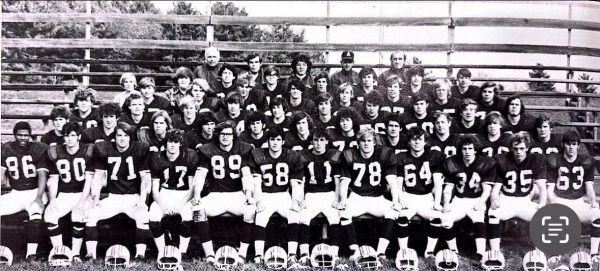



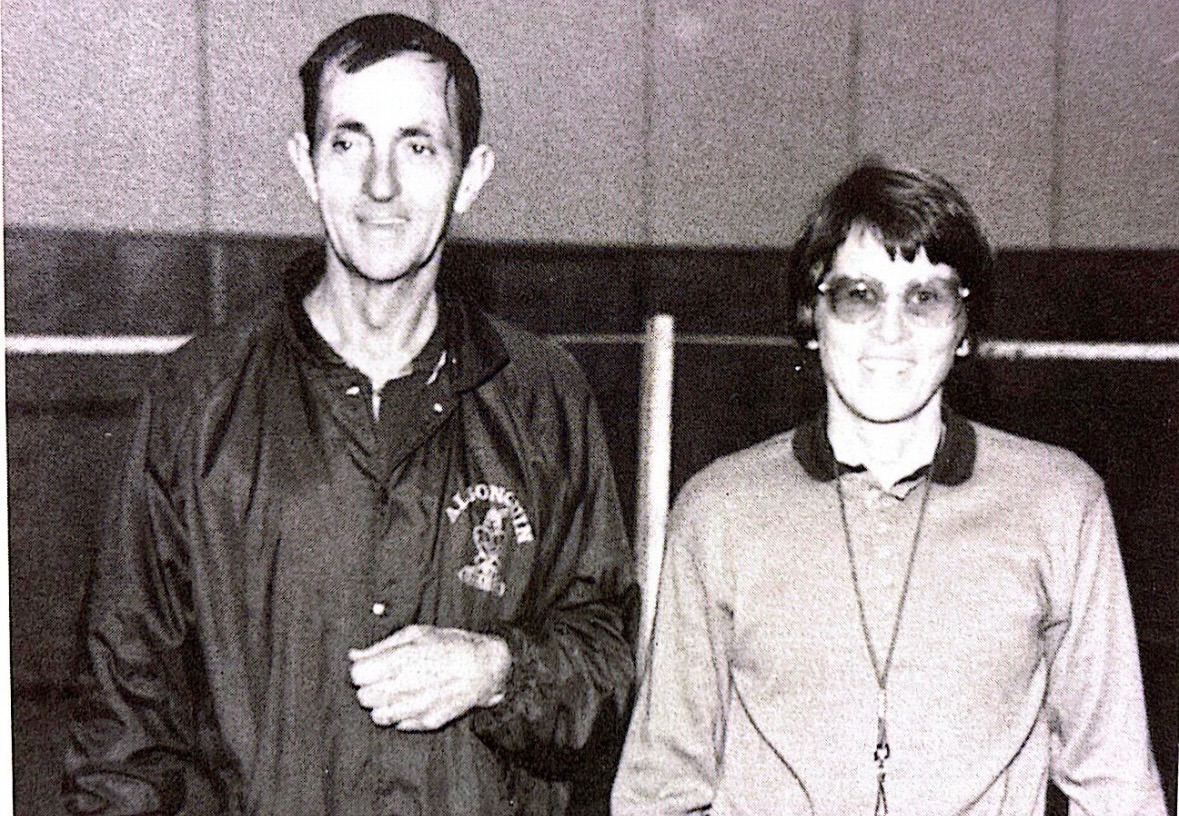
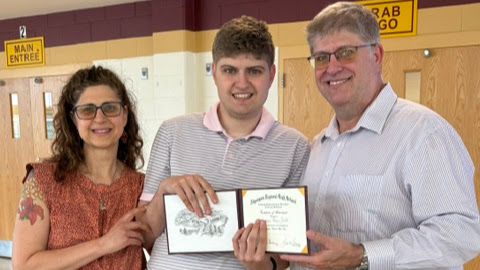


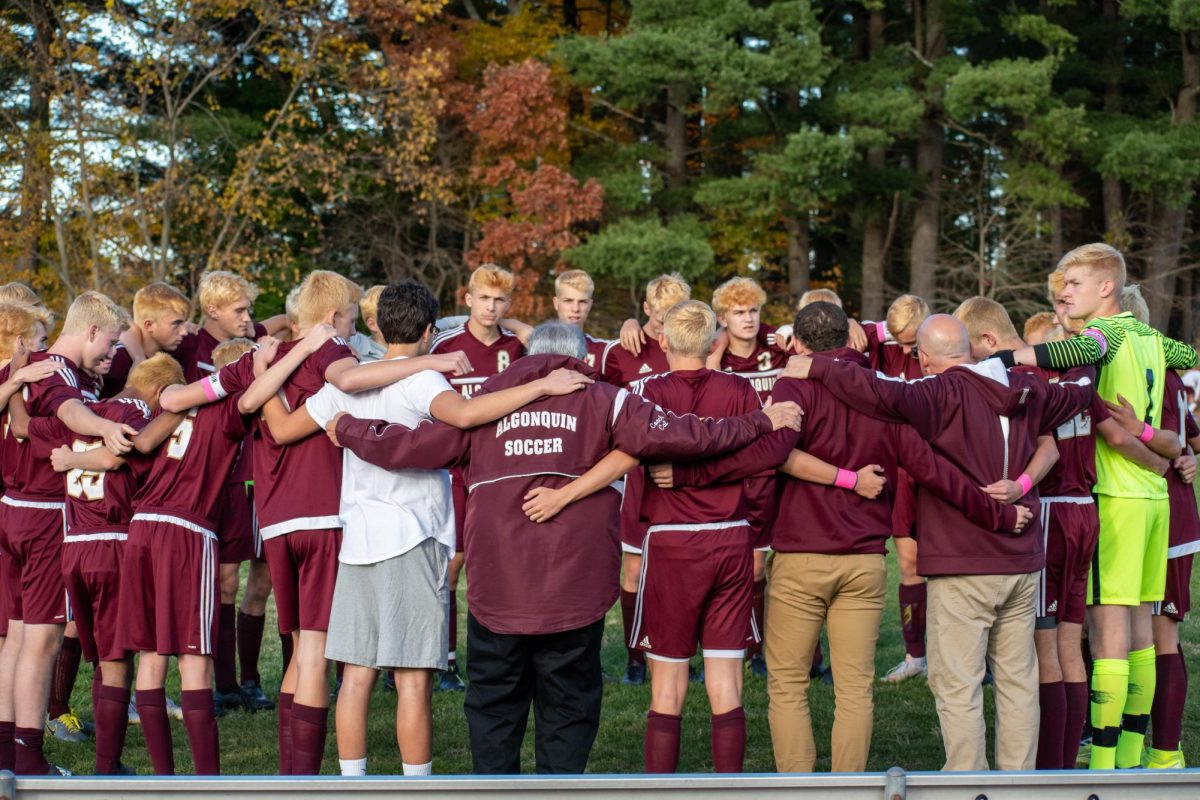

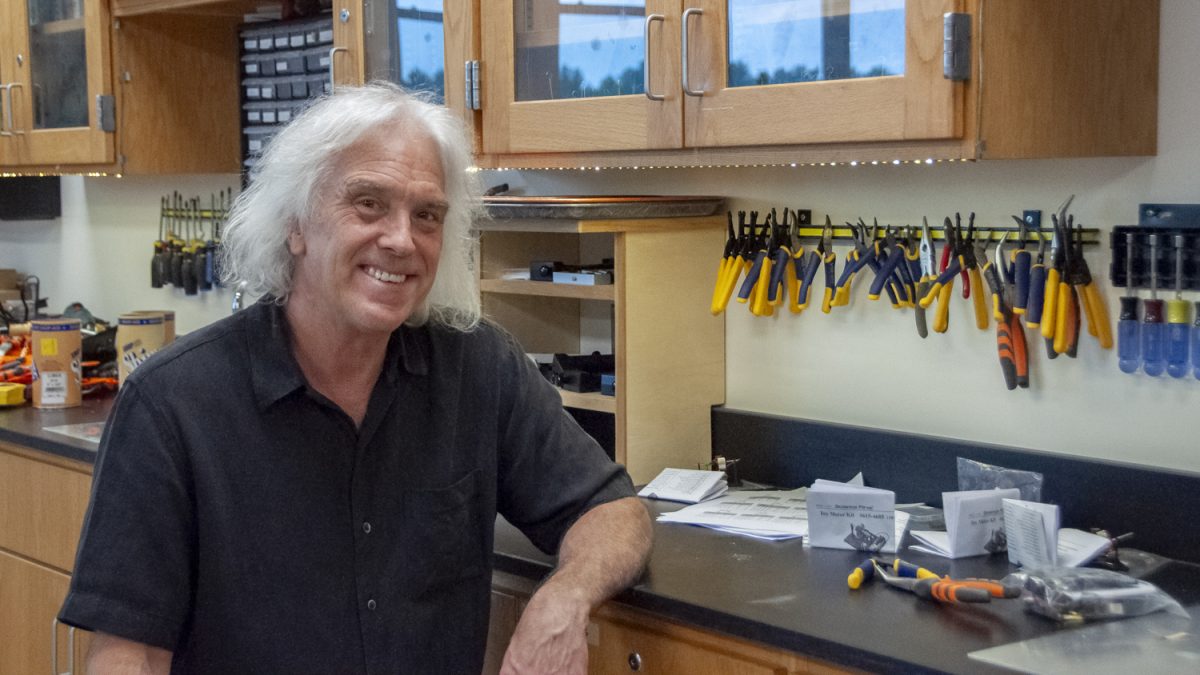
David Nelson • Feb 5, 2025 at 3:48 pm
What a great article. Ty. Mr Walsh the legend from a 1997 grad.